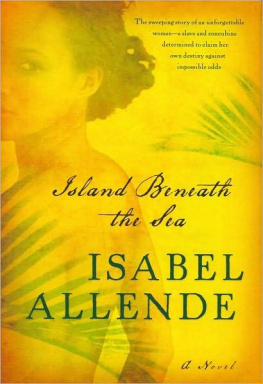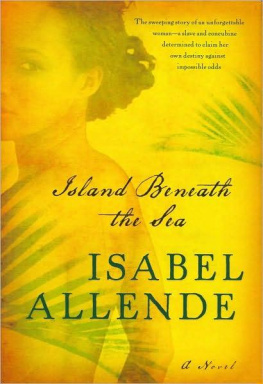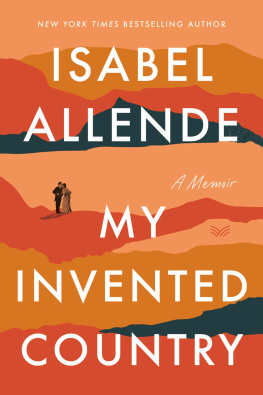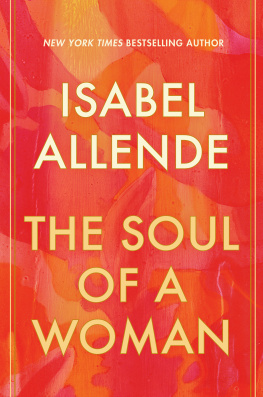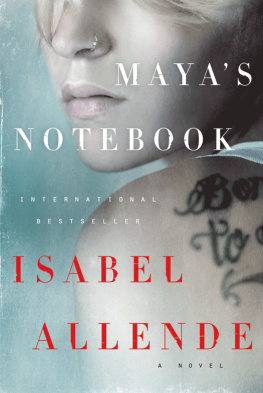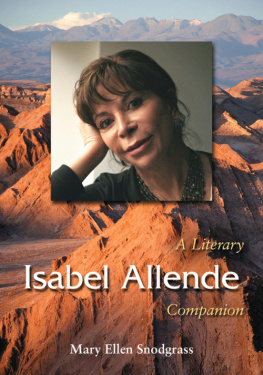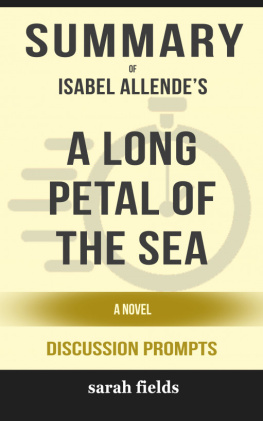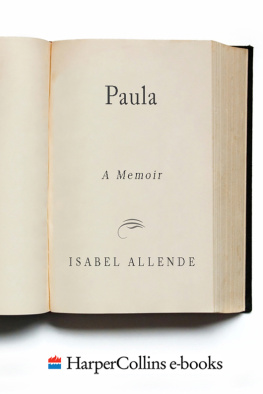T HERE IS no lack of drama in my life, I have more than enough three-ring-circus material for writing, but even so, I always approach the seventh of January with trembling. Last night I couldnt sleep. We were shaken by a storm; the wind roared among the oaks and rattled the windows of the house, the culmination of the biblical deluge of recent weeks. Some neighborhoods in our area were flooded; the firemen were not equipped to cope with such a major disaster, and neighbors waded out into the streets in water up to their waists to save what they could from the torrents. Furniture sailed down the main streets, and bewildered pets awaited their owners atop drowned cars, while reporters in helicopters captured scenes of this California winter you would have thought was a Louisiana hurricane. In some places traffic was blocked for a couple of days, and when at last the skies cleared and the magnitude of the damage could be seen, crews of Latino immigrants were given the task of pumping out the water and removing debris by hand. Our house, set high on a hill, takes face-on the fury of the wind, which bends the palms and from time to time tore the proudest trees out by the roots, the ones that do not bow their heads, but we escaped the flooding. Occasionally at the height of the wind, capricious waves rise up and overflow the one access road, and at those times we were trapped, observing from above the unusual spectacle of the raging bay.
I like it that winter forces us to turn inward. I live in Marin County, to the north of San Francisco, twenty minutes from the Golden Gate Bridge, among hills golden in summer and emerald in winter, on the west shore of the enormous bay. On a clear day we can see two other bridges in the distance, the hazy outlines of the ports of Oakland and San Francisco, the slow-moving cargo ships, hundreds of sailboats, and gulls like white handkerchiefs. In May we begin to see a few intrepid adventurers hanging from multicolored comets gliding swiftly across the water, disturbing the quiet of Asian grandfathers who spend their afternoons fishing from the rocks. From the Pacific one does not see the narrow access to the bay, which greets the dawn wrapped in fog, and the sailors of yesteryear passed on by, never imagining the splendor hidden a little farther in. Now that entrance is crowned by the elegant Golden Gate Bridge, with its proud red towers. Water, sky, hills, and woods; that is my landscape.
It wasnt the end-of-the-world windstorm or the machine-gun hail on the roof tiles that kept me awake last night, it was the anxiety of knowing that with the light of day it would be the eighth of January. For twenty-five years, I have begun a book on that date, more from superstition than discipline. Im afraid that if I begin on any other day the book will be a failure and that if I let an eighth of January go by without writing, Ill not be able to start for the rest of the year. January arrives after a few months without writing, months in which Ive lived turned outward, in the uproar of the world, traveling, promoting books, giving lectures, surrounded by people, talking too much. Noise and more noise. Most of all I fear going deaf, not being able to hear the silence. Without silence, Im done for. Last night I got up several times to wander through the house, using a variety of excuses, wrapped in Willies old cashmere sweater, so worn its become my second skin, with successive cups of hot chocolate in my hands, thinking and thinking about what I was going to write within a few hours, until the cold forced me back to bed, where Willie, bless him, lay snoring. Pressed against his naked back, I tucked my icy feet between his long, firm legs, breathing in the surprising scent of a young man that hasnt changed in all these years. He never wakes up when I press against him, only when I move away. He is used to my body, my insomnia, and my nightmares. And the same is true with Olivia, who sleeps on a bench at the foot of our bed. She never stirs. Nothing interrupts that silly dogs sleep, not the mice that sometimes creep out of their holes, or the funk the skunks emit as they make love, or the wandering souls murmuring in the darkness. If a madman armed with a hatchet should attack us, Olivia would be the last to know. When she came to us she was a wretched little beast the Humane Society had picked up from the dump. She had a broken leg and several broken ribs. For a month she hid among my shoes in the closet, shivering, but little by little she recovered from her previous ill treatment and emerged with her ears drooping and her tail between her legs. We knew then that she would never be a guard dog; she sleeps like a log.
By daybreak, finally, the wrath of the storm had ceased, but it was still raining. With the first light at the window, I showered and got dressed, while Willie, wrapped in his jaded sheik dressing gown, went to the kitchen. The smell of freshly ground coffee enveloped me like a caress. Aromatherapy. These everyday routines unite us more than the clamor of passion; when were apart it is this silent dance we miss most. We each need to feel that the other one is near, always there in that intangible space that is ours alone. A cold dawn, coffee and toast, time to write, a dog that wags her tail, and my lover. Life could be no better. Willie gave me a good-bye hug, for I was leaving on a long journey. Good luck, he whispered, as he does every year on this day, and I took my coat and umbrella, went down six steps, skirted the swimming pool, walked through fifty feet of garden, and reached the casita where I write, my study, my cuchitril. And here I am now.
I had barely lit a candleone always illuminates my writingwhen Carmen Balcells, my agent, called me from Santa Fe, a tiny town of crazed goats near Barcelona, where she was born. She intends to spend her mature years there in peace, but as she has energy to burn, she is buying the village house by house.
Read me the first sentence, demanded this larger-than-life mother figure.
I reminded her once more of the nine-hour difference in time between California and Spain. No first sentence yet. No nothing.
Write a memoir, Isabel.
I already wrote one, dont you remember?
That was thirteen years ago.
My family doesnt like to see itself exposed, Carmen.
Dont worry about anything. Send me a two- or three-hundred-page letter and Ill take care of the rest. If it comes down to choosing between telling a story and offending relatives, any professional writer chooses the former.
Are you sure?
Absolutely.
I N THE second week of December, 1992, almost as soon as the rain let up, we went as a family to scatter your ashes, Paula, following the instructions you had left in a letter written long before you fell ill. As soon as we advised them of your death, your husband, Ernesto, came from New Jersey, and your father from Chile. They were able to tell you good-bye where you lay wrapped in a white sheet waiting to be taken to the crematory. Afterward, we met in a church to hear mass and weep together. Your father was pressed to return to Chile, but he waited until the weather cleared, and two days later, when finally a timid ray of sun peered out, the whole family, in three cars, drove to a nearby forest. Your father went in the lead, guiding us. He isnt familiar with this region but he had spent the previous two days looking for the best site, one that you would have chosen. There are many places to choose from, nature is prodigal here, but by one of those coincidences that now are habitual in anything related to you, he led us directly to the forest where I often went to walk to ease my rage and pain while you were sick, the same one where Willie had taken me for a picnic shortly after we met, the same one where you and Ernesto liked to walk hand in hand when you came to visit us in California. Your father drove into the park, followed the road a little way, parked the car, and signaled us to follow him. He took us to the exact spot that I would have chosen, because I had been there many times to pray for you: a stream surrounded with tall redwoods whose tops formed the dome of a green cathedral. There was a fine, light mist that blurred the contours of reality: the light barely penetrated the trees, but the branches shone, winter wet. An intense aroma of humus and dill rose from the earth. We stopped at the edge of a pond formed by rocks and fallen tree trunks. Ernesto, serious, haggard, but now without tears because he had spilled them all, held the clay urn containing your ashes. I had saved a few in a little porcelain box to keep forever on my altar. Your brother, Nico, had Alejandro in his arms, and your sister-in-law, Celia, held Andrea, still a baby, wrapped in shawls and clamped to her breast. I carried a bouquet of roses, which I tossed, one by one, into the water. Then all of us, including Alejandro, who was three, took a handful of ashes from the urn and dropped them onto the water. Some floated briefly among the roses, but most sank to the bottom, like fine white sand.


